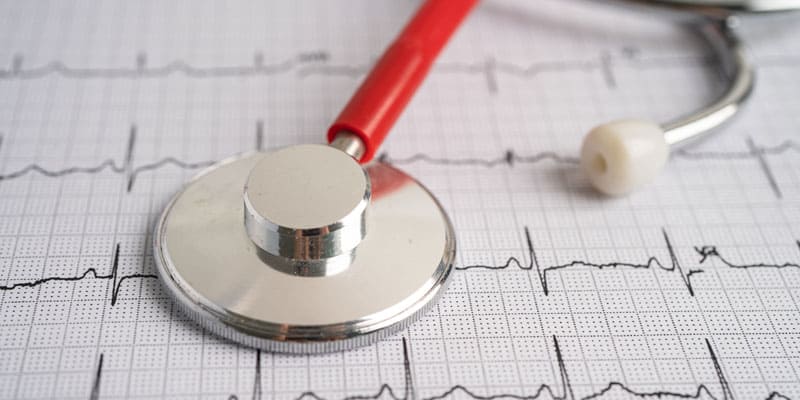Dr. Alan D. Steljes writes about heart rhythm and sleep. Read about how OSA can be relevant to the progression of AFib, and how CPAP can reduce the risks.
 by Alan D. Steljes, MD, FACC, FRCPC
by Alan D. Steljes, MD, FACC, FRCPC
Obstructive sleep apnea (OSA) is associated with several cardiovascular disorders as diverse as coronary artery disease, congestive heart failure, atrial fibrillation and pulmonary hypertension. Untreated OSA may exacerbate cardiac disease, by imposing significant mechanical, metabolic, oxidative or hemodynamic stresses on the heart. The hope is that effective therapy of OSA may ameliorate the trajectory of the cardiovascular disease. The evidence is most compelling for atrial fibrillation.
What is Atrial Fibrillation?
Atrial fibrillation (also known as AFib) is an irregular, usually rapid, heart rhythm. It arises from the upper chambers of the heart, the atria. AFib is the most common persistent heart rhythm disorder in adults and appears to be increasing in frequency.
What Are the Potential Complications of Atrial Fibrillation?
For patients whose heart function is already compromised in some way, the addition of AFib lessens the heart’s efficiency leading to symptoms of fatigue or shortness of breath.
AFib is also associated with an elevated risk of stroke. When the heart is out of rhythm, there is a tendency to form blood clots within the heart. If the clots stay in the heart, it is not usually a problem. However, if the clots break loose from the heart, it flows in a straight line to the brain where the clot blocks off a blood vessel, causing a stroke. You’ve seen the many ads on TV for blood thinners to prevent strokes in AFib patients. It is important to note that some patients have no symptoms at all, but are still at risk for stroke.
What Are the Treatment Options for Patients with Atrial Fibrillation?
Most patients require antiplatelet or anticoagulant therapy to reduce the risk of stroke. Medications may be prescribed to slow the rapid heart rate, or to restore and maintain normal heart rhythm.
Symptomatic patients, who have failed on medication, may require cardioversion, an electrical shock therapy designed to restore normal heart rhythm. Ablation is an invasive therapy designed to restore and maintain a normal heart rhythm.
Is Atrial Fibrillation Associated with Obstructive Sleep Apnea (OSA)?
About half of patients with AFib, also have OSA which appears to be relevant to the progression of AFib, since treatment with CPAP significantly reduces the risk of relapse following either cardioversion or ablation therapy.
“About half of patients with AFib, also have OSA which appears to be relevant to the progression of AFib, since treatment with CPAP significantly reduces the risk of relapse following either cardioversion or ablation therapy.”
How Does OSA Contribute to Atrial Fibrillation?
OSA causes structural and electrical re-modelling of the atria, distorting the electrophysiological mechanisms that maintain normal rhythm. CPAP reverses this re-modelling process over time.
The American Heart Association recommends that all patients with AFib should be screened for OSA which, when identified, should be treated. “Continuous positive airway pressure should be offered to patients with severe OSA, whereas oral appliances can be considered for those with mild to moderate OSA or for continuous positive airway pressure–intolerant patients. Follow-up sleep testing should be performed to assess the effectiveness of treatment.”1
Does Oral Appliance Therapy (OAT) Benefit Treatment of Atrial Fibrillation?
We are all familiar with the benefits of OAT in improving patients’ symptoms by relieving upper airway obstruction thereby reducing the cycle of recurrent hypoxia. It is not difficult to imagine that this would benefit the heart.
However, OAT is a technology which is still in its youth. Data supporting oral appliance specifically for atrial fibrillation is currently lacking. I am aware of one prospective study, sponsored by Texas A&M. However, the results have not yet been reported.
Is the Cost of PAP or OAT Justified?
Complications of AFib are costly. Patients with AFib incur approximately $28,000 additional health care costs annually, when compared to similar people without AFib.2 The costs of CPAP or OAT are small in comparison to costs of treating hospitalizations for AFib. Even small reductions in relapse rates are likely to reduce health care costs.
How Can Dentists Work with Cardiologists?
Sleep medicine spans multiple specialties and requires a multidisciplinary approach. Cardiologists in general are willing to screen their patients for sleep apnea. However, most cardiologists are not comfortable with hands on management of OSA. They are open to relationships with sleep medicine practitioners, including dentists, to manage and monitor their apnea patients.
For more information on heart rhythm and sleep, read “A Much Needed Paradigm Shift to Cardio-Sleep” at https://dentalsleeppractice.com/a-much-needed-paradigm-shift-to-cardio-sleep/.
- Obstructive Sleep Apnea and Cardiovascular Disease: A Scientific Statement from the American Heart Association. Yerem Yeghiazarians, Hani Jneid, Jeremy R. Tietjens, Susan Redline et al Circulation. 2021;144:e56–e67. DOI: 10.1161/CIR.0000000000000988
- Deshmukh A, Iglesias M, Khanna R, Beaulieu T. Healthcare utilization and costs associated with a diagnosis of incident atrial fibrillation. Heart Rhythm O2. 2022 Aug 4;3(5):577-586. doi: 10.1016/j.hroo.2022.07.010. PMID: 36340482; PMCID: PMC9626881.


 Alan D. Steljes, MD, FACC, FRCPC was trained as an interventional cardiologist. Since fellowship, he has obtained additional certification in nuclear cardiology, echocardiography, CT coronary angiography and finally sleep medicine. In 2010, he opened a two bed sleep lab, recognizing the heart-sleep apnea interaction. The initial 2 beds have been scaled up to 12 beds since associating with the Nevada Heart & Vascular Center. He has since retired from the cardiology practice but continues to oversee the sleep program. He remains passionate about spreading the word about sleep disordered breathing and the heart. He currently shares his time between Las Vegas, NV and Mount Pleasant, SC.
Alan D. Steljes, MD, FACC, FRCPC was trained as an interventional cardiologist. Since fellowship, he has obtained additional certification in nuclear cardiology, echocardiography, CT coronary angiography and finally sleep medicine. In 2010, he opened a two bed sleep lab, recognizing the heart-sleep apnea interaction. The initial 2 beds have been scaled up to 12 beds since associating with the Nevada Heart & Vascular Center. He has since retired from the cardiology practice but continues to oversee the sleep program. He remains passionate about spreading the word about sleep disordered breathing and the heart. He currently shares his time between Las Vegas, NV and Mount Pleasant, SC.